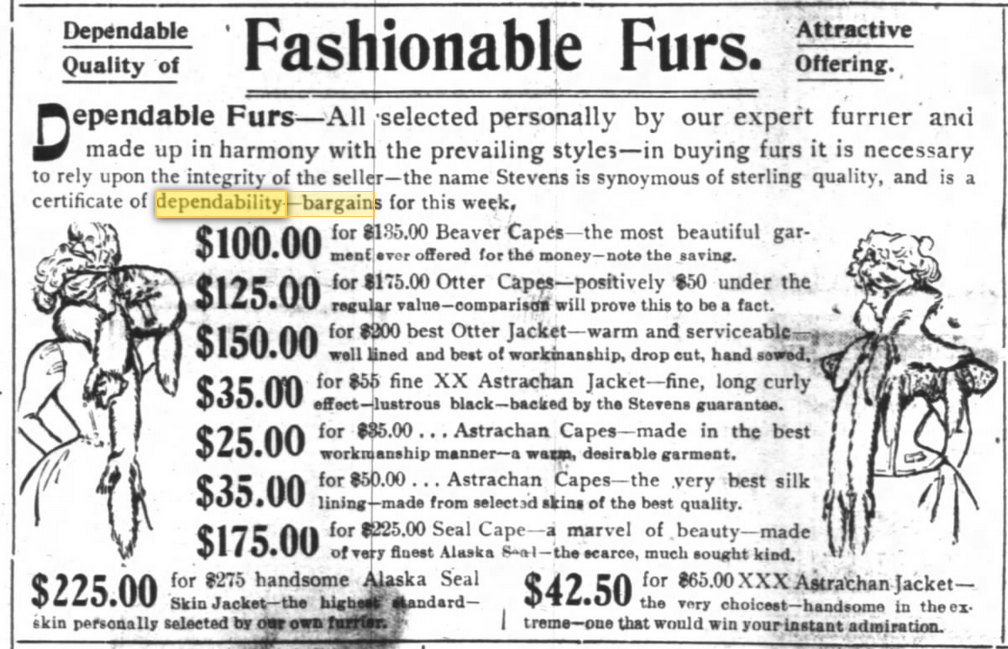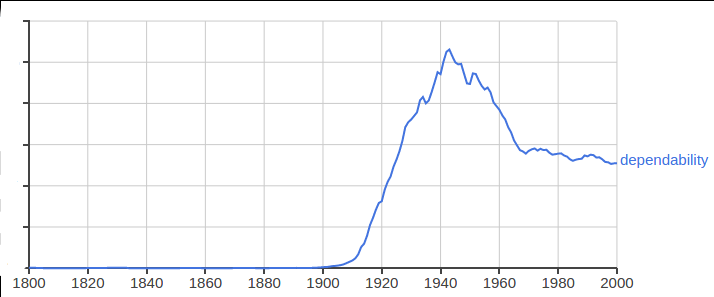Fake word history of the month
« previous post | next post »
Jason Torchinsky, "A very common word was invented by Dodge", Jalopnik 12/15/2014:
Dodge is known for producing many things, most notably cars, minivans, and sometimes large, lingering clouds of tire smoke. Oh, and the K-Car. But one thing I didn't realize was that they're also in the word business, coining an extremely common word way back in the 1910s. [self-referential clickbait omitted]
That wasn't so bad, right? Sorry to do that, but, you know, I have old cars to maintain. Okay, here's the word that didn't exist before some Dodge PR guy came up with it: Dependability.
Um, no. The OED's entry for dependability, not updated since 1933, has
1901 F. T. Bullen Sack of Shakings 264 Next to the Trades in dependability..are the west winds of the regions north and south of the Tropics.
It's easy to antedate this with modern resources — thus from an advertisement in the Chicago Tribune for Sunday, 13 Nov. 1898 (two years before the Dodge Bros. founded their company in 1900, and 17 years before 1915, when Dodge began building complete cars rather than parts for other automakers):
Or from "The Manufacture of Crucible Cast Steel, by Mr. Henry Seebohm", The Journal of the Iron and Steel Institute, 1884:
Or R.H. Inglis Palgrave, "Notes on Banking in the United Kingdom, Sweden, Denmark, and Hamburg", Journal of the Royal Statistical Society, Vol XXXVI, Year 1873:
It's true that the 1895 Century Dictionary has dependableness but not dependability, reflecting the fact that the frequency of dependability increased rapidly after 1900:
But invented by "some Dodge PR guy" in the 1910's? I don't think so.
Mr. Torchinsky didn't invent this legend — he got it from a nicely-done online car-dealership history ("Reed Brothers Dodge History 1915 – 2012"), which in turn got it from a circa-1930 Dodge advertisement:
The ad doesn't actually claim that Dodge invented the word dependability — it just uses temporal correlation to imply causation: "Dodge Brothers put a certain quality into a motor car. And suddenly, everywhere, people were talking about Dependability."
The most interesting thing about this ad, it seems to me, is that it puts forward a sensible version of the Sapir-Whorf hypothesis, a decade before Benjamin Lee Whorf's "The Relation of Habitual Thought and Behavior to Language":
Give the world a new thing, and the world will immediately find a new word to describe it.
This is not the direction of influence that Whorf preferred, but it's closer to the way that Sapir put it a few years before in "The Grammarian and his Language", The American Mercury, 1924:
The outstanding fact about any language is its formal completeness. This is as true of a primitive language, like Eskimo or Hottentot, as of the carefully recorded and standardized language of our great cultures. […] [W]e may say that a language is so constructed that no matter what any speaker of it may desire to communicate, no matter how original or bizarre his idea or his fancy, the language is prepared to do his work.
In the 1920s and 1930s, the relations among language, thought, and reality were apparently in the air — for Dodge PR guys as well as for linguists and philosophers.
[h/t Alex King]





Ben Zimmer said,
December 17, 2014 @ 7:46 am
A nice example of corporate etymythology (for more, see here and here).
cM said,
December 17, 2014 @ 10:38 am
Those are some impressive fur prices.
I couldn't find inflation data going back far enough, but by my guesstimate, that $100 beaver cape would cost somewhere north of $7000 today.
Another comparison: It's roughly equivalent to the price of a Model T in the late 1920s.
Richard Hershberger said,
December 17, 2014 @ 4:40 pm
This answers a minor mystery that has long bugged me. Richard Grant White, a 19th century American language maven of the lowest sort, had a peeve about "reliable." He, I believe, introduced the "[X] is not a word" meme, and "reliable" was high on his list. His argument was that the '[x]-able' construction meant 'able to be [x]ed" and therefore could only be used with transitive verbs. "Rely" is intransitive, taking a prepositional phrase as its complement. So, White argued, you can't have something like "You can rely on him: he is reliable." It would have to be "You can rely on him: he is relyonable."
The general problem, of course, was the White had a model of how English worked, and when confronted with facts that did not fit the model, he concluded that the facts must be wrong. More specifically, he didn't know about prepositional verbs as a class, since they had not yet been described and therefore were not discussed in grammars. Therefore he could not address how prepositional verbs might work in the -able construction.
He treated "rely" as a special case. But of course it is no such thing. English has lots of prepositional verbs. Specifically, "depend" is a close parallel, both in form and meaning. So why didn't White bitch about "dependable"? Now I know: it was rare, and he legitimately didn't notice it.
Brett said,
December 17, 2014 @ 4:59 pm
Give the world a new thing, and the world will immediately find a new word to describe it.
This seems odd, since I don't perceive any difference in meaning between "dependable" and the older "reliable." I guess the ad copy writers were hoping people wouldn't think of that.
Shubert said,
December 17, 2014 @ 6:21 pm
dodge de dog is indeed dependable, I had one.
maidhc said,
December 18, 2014 @ 1:05 am
What they were really saying back in the 1910s was "get out and get under".
https://www.youtube.com/watch?v=vQsdEkQCZSs
Ken Grace said,
December 22, 2014 @ 2:33 am
My wife came up with another word in this class recently when she commented on songs that were considered unlistenable (of which there are way too many, sadly). "Shouldn't it be 'unlistenable to'?" she said. A few dictionaries I subsequently checked offered both versions as correct – but 'unlistenable' seems more natural. Thanks for the illuminating article.